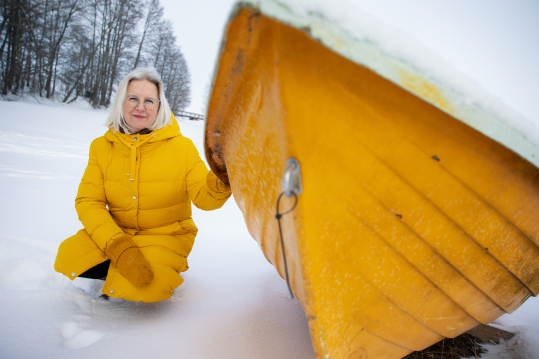A good co-worker keeps skills up to date and is ready for change
09.03.2021 | News

When you take care of updating your own skills, act in accordance with the common goals and ensure the smooth running of the work, you can go a long way as a co-worker.
Strict focus on one's own work alone is not enough for a good co-worker relationship, according to the research project led by Professor Satu Teerikangas, in which Finnish employees in the banking, social and health care and real estate sectors were interviewed.
Even though being a 'workmate' may sound too informal and you'd rather not get involved in other people's (work-related) worries, being a good co-worker can't be outsourced.
“Being a workmate is our basic role. It is a question of whether we are aware of it or not,” says Teerikangas, who is the professor of management and organization at the University of Turku School of Economics.
“Everyone's contribution is important. We are all workmates to dozens, hundreds, even thousands of people. A good co-worker relationship be can be consciously nurtured,” she encourages.
We need people who are supportive of the work community, work towards common goals and take responsibility naturally. Being a good co-worker also does not depend on role, status and experience.
“Conscious support of co-workers is an underused resource. Awareness of our own role and its active implementation – this is where we all have something to improve in working life.”
Bright, humane, trustworthy, brave
When considering the qualities of a good co-worker, Teerikangas' research team highlighted four traits: brightness, humanity, trust, and courage.
Brightness indicates a positive attitude. Humanity can manifest itself, for example, in being reasonable in one’s requests. It takes courage to dare to be yourself or even dare to talk about difficult issues in a skilful way.
You must be able to trust your co-worker's skills. Give them space to do their work in a way that suits them without suspicion or distrust. Demonstrating trust is about giving someone space and, by default, appreciating the other's contribution.
“Everyone has space to do their job, i.e. not interfering but completely trusting the other person. It’s nicer not to waste energy thinking about how someone is performing, especially when working with experts in their field and peers.”
No one has all of the ideal qualities of a perfect co-worker. It's also good to be aware of your own imperfections as a co-worker. In addition, Teerikangas reminds us that not all our days are the same and everyone is unique.
Three points of good workmatesBeing a good co-worker requires an active approach and a wide variety of actions. This three-point recipe will get you well under way: professionalism, a common direction and ensuring that the work goes smoothly.
“I am a professional in my work” A skilled employee is valued. Professionalism can be maintained by updating one's own skills.
“I work for the common goal” It is useful to think about what the direction of the employer and the team is. Usually it is about aiming for the well-being of the clients and the best outcome for them. As an incentive to work, for example, teachers may express the common goal of educating smart Finnish young people.“I ensure the smooth running of work and customer service” Customer service is often done together. When everyone does their job well, smooth customer service is created. Co-workers find it easy and good to work with each other.

Satu Teerikangas
Hierarchies of friendship
For some of the respondents, it was important that a co-worker is also a friend outside of work. For some, the opposite was the case, i.e. drawing the line between co-workers and friends was important.
Satu Teerikangas reminds us that different types of personal relationships and their importance vary according to life situations. At some point, co-workers may be the most important contacts, whereas at another stage in life, friends from other contexts have special value.
Whether you feel that co-workers are "just co-workers" or friends, according to Teerikangas, a well-functioning work community is identified by everyday things: whether the work group eats or has coffee together, does something nice together and talks about things openly and naturally.
A common supplementary programme can therefore be important in that it allows for a better understanding of the other person, as different environments and spending time together encourage revealing more than just a professional personality and background. Trust builds up as you get to know each other better.
Tune your thoughts and actions to becoming an active co-worker
Satu Teerikangas encourages everyone to think about what it means to be a co-worker in everyday working life. You can get started with the following reflections and actions:
- Be aware of your own ongoing impact on the work community. Turn this into consciously being a good co-worker.
- Everything you do has meaning: every little gesture, greeting and short encounter creates an atmosphere. Think about the kind of atmosphere you create around you.
- Thank, praise and be grateful.
- Listen to others.
- Ask and discuss the expectations of others.
- Keep your skills up to date and share them with others.
- Find your own way to be an active co-worker.
The TYÖ2 research project, led by Professor Satu Teerikangas and funded by the Occupational Safety and Health Fund, investigated co-working. Teerikangas' research team included researchers Arto Ryömä, Maarit Laiho and Suvi Satama.
Text Iida Ylinen Photos Petri Koivisto


